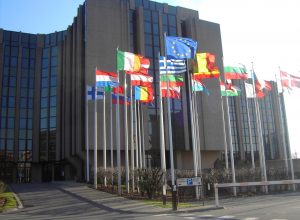
Image Credit: en.wikipedia.org
There is shock and incredulity following the victory of the ‘Leave’ vote in Britain. I will let my colleagues who follow closely the EU to pick up the threads of both this negotiation and the future of this supranational institution. There will be much analysis over this difficult exit and the reduction of the EU from 28 to 27, though it may well be that it will return to 28 if Scotland decides it unprepared to leave the EU.
But let’s turn to the implications of the British exit on larger global order questions. The vote to leave immediately brought to mind the phrase that adorns this post that my colleague at Brookings, Tom Wright used to describe Donald Trump’s foreign policy. The post from Brookings (June 3, 2016) was using Hilllary Clinton’s San Diego speech to examine Trump’s foreign policy ideas. As Tom concluded:
So he will double down. And as he does, he will reinforce every word of Clinton’s San Diego speech and further alienate those voters who may be skeptical of an activist foreign policy but do not want to run the experiment of deliberately burning the international order to the ground.
Make no mistake the British decision to leave and the possible dismantling of the EU – immediately one country but conceivably more – leading to the demise of this supranational institution – fits Trump’s foreign policy vision very well. As Trump is quoted in the NYT as saying: “I said this was going to happen, and I think that it’s a great thing.” and also, “Basically they took back their country,”
The narrative is clear: to be great a country one must laser-like focus on prosperity, abjure costly alliances and allies, close the borders to wayward immigrants and build economic prosperity with cheap money and exports. As Ashley Parker wrote of Trump’s reaction to the vote and its wider implications:
“People want to take their country back, they want to have independence in a sense, and you see it with Europe, all over Europe, and you’re going to have more than just, in my opinion, more than just what happened last night,” Mr. Trump said. “You’re going to have many other cases where people want to take their borders back, they want to take their monetary back, they want to take a lot of things back, they want to be able to have a country again.” … “People are angry, all over the world people, they’re angry,” he said. “They’re angry over borders, they’re angry over people coming into the country and taking over, nobody even knows who they are. They’re angry about many, many things.”
But there are broader implications and they go to today’s global order. And the consequences for the global order are the following according to the NYT article, this by Jim Yardley:
… the British vote also will inevitably be seized upon as further evidence of deepening public unease with the global economic order. Globalization and economic liberalization have produced winners and losers — and the big “Leave” vote in economically stagnant regions of Britain suggests that many of those who have lost out are fed up.
And there is the rub. The vote and the attitudes of significant voter blocs in Britain, the Netherlands, France and elsewhere in Europe and as we have witnessed in the United States with the Rise of Trump is a growing rejection of the liberal international order built by the United States and the EU and key allies in Asia. Those who are fed up are anti-free trade, anti-globalization, anti-immigrant and unwilling to share sovereignty in a collective effort to build prosperity and indeed international stability. As my colleague Stewart Patrick of CFR wrote today at his blog the Internationalist:
Besides posing an immediate, existential crisis for the European Union and the United Kingdom itself, the outcome will embolden skeptics of international institutions and multilateral cooperation in the United States. … Britain’s choice, finally, will reverberate in the United States. While most commentators have focused on potential global economic turmoil, given London’s prominence in financial markets, the political implications for U.S. global leadership may be profound. “Brexit” will surely reignite simmering domestic debates over how to balance the defense of U.S. national sovereignty with the imperative of international cooperation.
The hyper-nationalist/populism of Donald Trump, if it were successful in the Presidential election in the United States in November would threaten global order stability. Already we have seen a stronger strain of geopolitics in the contemporary global order with Russia in the Ukraine and China in East Asia. But that strain is held in check by the liberal institutional order built over many decades. And though some have indeed not benefited from the prosperity as much as others liberal internationalism has propelled nations forward. Dismantling it, as very likely Donald Trump would were he to become President, would pose a far greater threat to international stability than has been seen since the end of the last great war. The ‘Age of Chaos’ would have returned.
As Stewart Patrick suggests in examining the triumph of national sovereignty:
But sovereignty has two other dimensions besides authority. The first is autonomy, or the freedom to make policy decisions independently. The second is control, notably over the nation’s destiny. The dilemma is that autonomy and control often work at cross purposes in managing globalization. To get what it wants—whether reducing carbon emissions to expanding trade—the United States must often make commitments, enter into treaties, or support multilateral organizations. These arrangements can sometimes constrain its options, but they also promise the United States greater control over outcomes that it could never achieve on its own.
Let’s not ‘burn the international order to the ground’.

